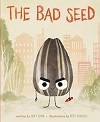|
The Bad Seed

Last updated Friday, September 28, 2018
Author: Jory John
Illustrator: Pete Oswald
Date of Publication:
ISBN: 006246776X
Grade Level: Kindergarten (GLCs: Click here for grade level guidelines.)
Date(s) Used: Sep. 2018
Synopsis:
This is a book about a bad seed. A baaaaaaaaaad seed. How bad? Do you really want to know? He has a bad temper, bad manners, and a bad attitude. He's been bad since he can remember!
With Jory John's charming and endearing text and bold expressive illustrations by Pete Oswald, here is The Bad Seed: a funny yet touching tale that reminds us of the remarkably transformative power of will, acceptance, and just being you. Perfect for young readers, as well as anyone navigating their current world, The Bad Seed proves that positive change is possible for each and every one of us.
| Discussion topics for before reading: |
| • |
What is a bad seed?
|
| • |
What is the bad seed doing with a crayon?
|
| • |
Do you think people are born bad or become bad?
Vocabulary
|
| • |
mumble - say something indistinctly and quietly, making it difficult for others to hear.
|
| • |
unremarkable - not notably or conspicuously unusual, ordinary. Not worthy of attention.
|
| • |
goner - informal, a person or thing that is dead, lost or past recovery.
|
| • |
suit - to be appropriate or becoming to, suitable.
|
| • |
pointless - without force, meaning or relevance.
|
| Discussion topics for during/after reading: |
| • |
Why did the bad seed turn bad for a while?
|
| • |
Why do you think he went back to being good?
|
| • |
What motivates you to be good?
|
| • |
Are nuts also seeds?
|
| Craft ideas: |
| • |
Draw different types of seeds. See other examples on inside cover of book.
|
| • |
Draw a sunflower or watermelon with lots of seeds.
|
| • |
Create a cut-out of your favorite seed/nut you like to eat or that you saw in the story.
|
| • |
Draw a scenario that shows how to be a good seed or kid.
|
| • |
Check our craft ideas on Pinterest!
https://www.pinterest.com/readingtokids/september-2018-back-to-school-fun/
|
*Note: These craft ideas are just suggestions.
You can use them, but you don't have to use them.
You can expand upon them, or add your own twist.
Remember, though, that the focus of your time should
not be on the development and execution of a craft;
the focus should be on the read-aloud and the
enjoyment of the book!
|
